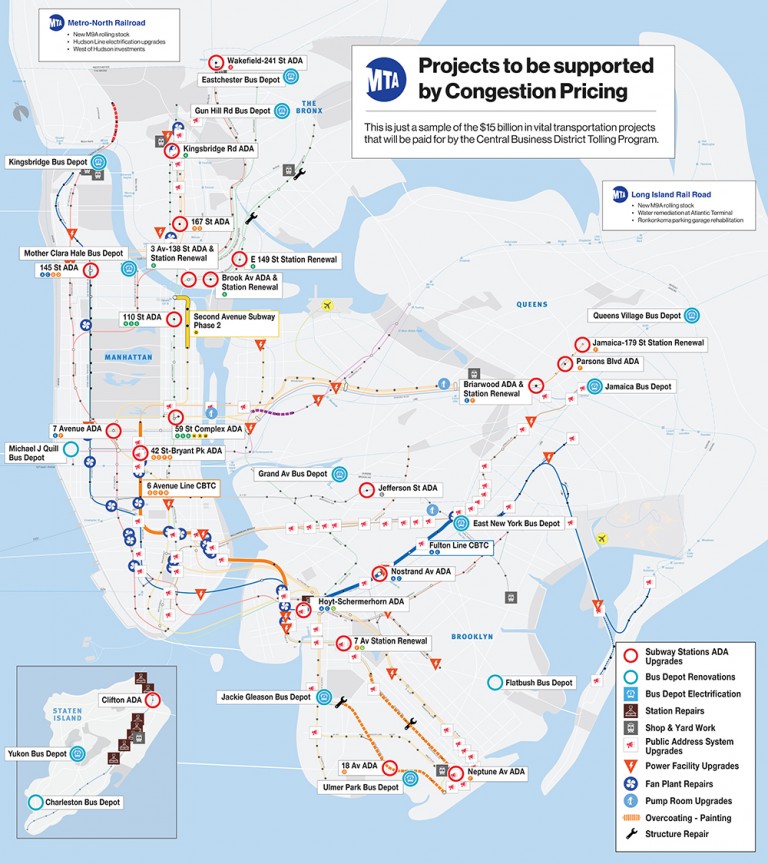By Forum Staff
The Metropolitan Transportation Authority on Monday detailed projects across the subway system, buses, Metro-North Railroad and the Long Island Rail Road that are at risk due to the lawsuits against congestion pricing.
Anticipated congestion pricing bond proceeds of $15 billion make up more than 50 percent of the remaining funds in the MTA’s 2020-2024 Capital Program. As a result, the MTA Capital Program must be largely placed on hold, halting advertisement of nearly all new construction contracts and moving forward only with limited, urgent exceptions.
Without the funding Congestion Pricing will provide, these projects to make the transit system safer, more reliable, accessible and equitable for the millions of commuters who rely on public transportation every day are at risk.
According to the MTA, investments supported by congestion pricing funds are essential in advancing projects that would create a more efficient and sustainable transit system that meets the needs of New Yorkers today and in the future.
A sample of affected projects follows, by category.
Reliability: Congestion pricing revenue will contribute $1 billion to purchase new subway cars, new M9A cars for the LIRR and Metro-North, and new locomotives for the LIRR which would reduce emissions and improve reliability for LIRR
Additionally, signal modernization projects on the Fulton Line A, C in Brooklyn and 6 Av Line B, D, F, M in Manhattan have already been placed on hold. These projects would benefit more than 1.6 million daily riders and include installation of communication-based train control and replacement of 70 switches and 17 interlockings dating back to the 1930s.
Equity and Sustainability: Funds from congestion pricing would enable purchase of more than 250 new electric buses and 11 bus depots across all five boroughs to operate and maintain electric bus fleets:
- East New York Depot
- Eastchester Depot
- Grand Avenue Depot in Maspeth
- Gun Hill Depot in Baychester, the Bronx
- Jackie Gleason Depot in Sunset Park, Brooklyn
- Jamaica Depot
- Kingsbridge Depot in Inwood, Manhattan
- Mother Clara Hale Depot in Harlem
- Queens Village Depot
- Ulmer Park Depot in southern Brooklyn
- Yukon Depot in New Springville, Staten Island
State of Good Repair: Without congestion pricing, the MTA runs the risk of falling behind on repair work necessary to update aging infrastructure and assets critical to the reliability of the system. These assets, often hidden from the public eye, are essential and lack of investment could lead to disruptive outages, including:
- Repairs and overcoating to keep our elevated lines structurally sound.
- Substation repairs and renewals to keep power running.
- Repairs to emergency exits and fan plants to keep customers safe in an emergency.
- Shop and yard repairs across the system are necessary to keep facilities running.
- Water remediation at LIRR Atlantic Terminal and rehabilitation of Ronkonkoma’s LIRR parking garage.
All the projects outlined are not only critical to New Yorkers, but for the thousands of workers and businesses that depend on these projects for their livelihoods, MTA officials said. The capital program is estimated to support 57,400 jobs—23,000 of which are at risk. This has an impact on the economy at every level, especially for minority-owned, women-owned and federally designated disadvantaged businesses as well as businesses owned by veterans disabled in the line of service. Last year, the MTA paid $833 million across more than 500 different firms in these categories.

